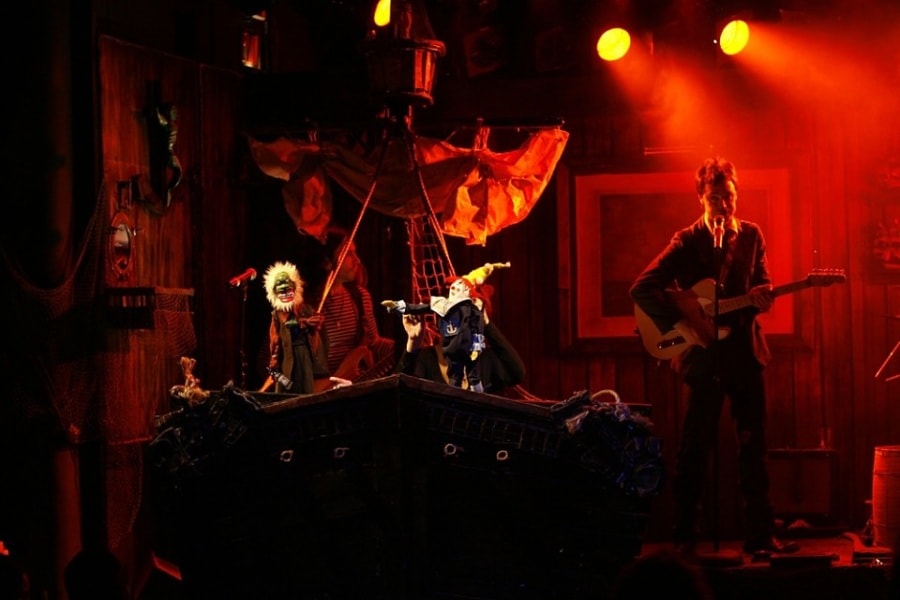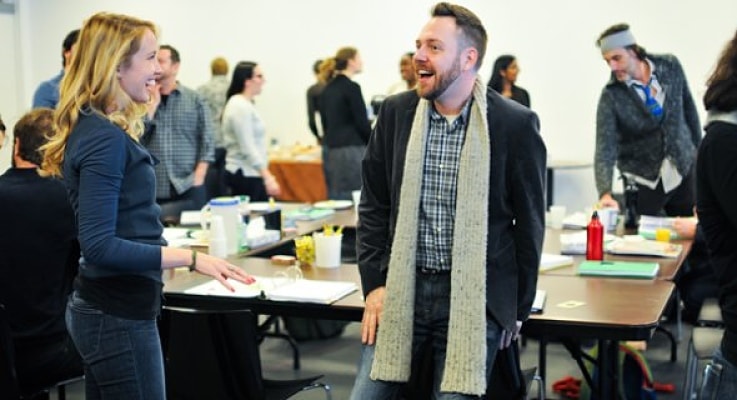Nick Jones made a confession to Marsha Norman and Christopher Durang, codirectors of the Juilliard School’s competitive playwriting program, shortly after he was admitted there in 2009 to study. His writing sample, a historical farce called The Coward, was the first play he’d ever written “for human actors.”
Juilliard may have been surprised, but enthusiasts of Jones’s work know that the real top billing in his early plays went to hard-living, libidinous puppets—dummies with names like Captain Clamp and Tudley—while the human actors played supporting roles: doing tech, playing the punk-rock soundtrack, or dressing up as the Manhattan skyline.
In a 10-year career that has seen Jones grow from downtown vaudeville impresario to highly sought-after playwright at prominent theatres around the country, he has learned to nimbly toe the line not only between the inanimate and the fleshly but between madcap lunacy and tragedy.
Now, with a new production, Verité, premiering at Lincoln Center Theater this month, and another premiere, Important Hats of the 20th Century, slated at the Manhattan Theatre Club in the fall—not to mention additional commissions from California’s Old Globe and Center Theatre Group and Boston’s Huntington Theatre Company—it is clear that Jones has come to feel equally in his element with both puppet tales and more traditional scripted fare.
Juilliard’s Norman wryly notes that she detects in Jones’s recent writing a greater confidence in and knowledge of what human actors can do. And, to be fair, actors in a typical Jones play have to meet some unorthodox demands: portraying a chimpanzee with Hollywood dreams (Trevor), dueling as a skittish 17th-century dandy (The Coward), or singing an upbeat but unprintable ode to bodily functions (Homunculus). Deploying what Norman calls a “joyously deranged” imagination, Jones has forged an alternative universe where anarchy and id always conquer humanity’s more civilized impulses. It happens, though, with such crack comic timing that bemused audiences may not flinch when chaos inevitably descends.

“I still retain my love of absurdity,” Jones will tell you, “and that began at the Bowery Poetry Club with these punk-rock puppets.” Jones is referring to Jollyship the Whiz-Bang, the popular and freewheeling aggregate of rock opera, pirate tale and sketch comedy created with classmate Raja Azar back in 2002. While working tech for the Bindlestiff Family Cirkus, the pair was inspired by that downtown variety act’s raunchy, cabaret-style aesthetic to create a skit that combined high and low culture.
Jollyship—in which a traditional Balinese rod puppet was reborn as the hedonistic character Clamp—soon found a regular home at the Bowery club, where fans returned to find out whether the story’s wooden antiheroes would fulfill their quest for the pleasure-seekers’ paradise known as “Party Island.”
After receiving early support from club proprietor Bob Holman, Jollyship’s success (and the tenacity of its creators) precipitated a succession of new “episodes” at bars around the country, and subsequently at such locales as the Edinburgh Festival Fringe and Sarah Lawrence College, where Clamp ostensibly matriculated as a student for a single day of orientation. Kim Rosenstock, then the literary manager at New York City’s Ars Nova, caught a performance and, recognizing a brand of eccentricity that could click with that venue’s eclectic programming, engaged rising directorial star Sam Gold to fine-tune the show.
For Gold, it was unlike any other project he had ever participated in. Jones and Azar are “mad geniuses, working outside of traditional conventions,” Gold notes admiringly. “They had their own thing that developed organically—to me, that’s the best kind of theatre.” In his initial role as dramaturg, Gold’s challenge was sifting through “treasure troves” of material en route to clarifying the narrative arc. But adapting such a purposefully unruly show for an evening-length performance was not a straightforward task, and it took more than a year for this more ambitious version of Jollyship to come to fruition.
Meanwhile, Jones was invited to join the inaugural Play Group for writers at Ars Nova, which included Juilliard alumni Liz Meriwether and Beau Willimon. Jones cites his relationship with the group, and with Gold—who would later direct The Coward at LCT3 in 2010—as pivotal catalysts in his career. “It was then that I started to realize how theatre works,” Jones remembers.
An Alaska native, Jones had aspirations to be a writer from an early age, but his literary influences tilted more toward Thomas Pynchon than anything theatrical. (Auspiciously, his late grandmother bequeathed to him a signed script from George Bernard Shaw, an inheritance from his theatre manager great-grandfather.) As an undergrad at Bard, Jones was introduced by Holman, a poet as well as a club honcho, to the plays of Joe Orton and Charles Ludlam, whose influence is discernible in the understated deadpan of Jones’s characters, even as they face ludicrous and extreme peril.
In his 20s, the writer took on a litany of odd jobs, beginning with administrative assistant at the Manhattan venue Performance Space 122, and—as his ambitions for Jollyship grew—dedicated himself to becoming a multidisciplinary autodidact. He learned to build puppets and play music more proficiently while living in Queens at the Flux Factory, where, he says, “I had 15 roommates and paid $300 rent.”
For a time, Jones became disheartened by the seemingly limited options for the prospects of a creative life after Jollyship—he wondered whether the work he had committed so many years to had been too site-specific, too ephemeral, and deficient in the qualities that would make it suitable for submitting to theatres. He recalls thinking, “I have a daughter. I am eventually going to have to pay for college, and I’m playing with dolls.” Original members of the Jollyship ensemble began to move on with their lives. Jones pursued a real-estate license.
But while working with Gold and the Play Group, Jones felt his views on writing evolving and his approach becoming more formally rigorous. Although his peers at Ars Nova were “more accomplished in terms of their credentials, they had the same sense of humor,” he acknowledges. The mutual admiration from kindred spirits signaled to Jones that a writing career might not be a pipe dream. By 2008, the Ars Nova production had elicited critical raves and a sold-out run, and Jones soon became a playwriting fellow at Juilliard, where the emphasis on encouraging writers to “protect your points of view, the things you love,” in his words, was a natural fit.
Though Jones often expresses humility when speaking about his nontraditional pedigree, he is unapologetic about his process, admitting, “I revise to the end.” Gold attributes this zealousness to performing variations of the same production to new audiences, night after night, and likens the sublime results to “natural selection.” Actor Steven Boyer, a frequent collaborator, recalls a three-day workshop where “every day, Nick would come in with a completely different script. Not even a joke would be the same. On the last day, he wrote this amalgamation of all the different versions, and it worked brilliantly. We had two workshops—and he did that twice!” (Boyer, who is headed to Broadway in his much-lauded role in Hand to God, another play with a sybaritic puppet, credits Jones for his first exposure to working with inanimate actors.)
While Jones clearly enjoys working in other mediums—in addition to his playwriting career, he is now a regular writer and coproducer for the Netflix hit Orange Is the New Black, for which he was nominated for a 2014 Writers Guild Award—he appreciates how live theatre uniquely lends itself to “creating something raw and then uncovering or discovering it.” His mentor Norman believes the writer’s years of self-producing have imparted critical knowledge. Today’s playwrights, as she sees it, must be literate in the business of production—marketing, budgeting and the ability to differentiate which ideas can find an audience. The latter has been on Jones’s mind of late; he is not unaware of the dangers that arise when the writer yields too much for the sake of commercial success.

The fear of bending to accommodate powerful interests seeps to the forefront in Verité, which concerns a writer whose dreams appear to come true when she lands a book deal. The play, to be helmed by Trevor and Hand to God director Moritz von Stuelpnagel, was born out of Jones’s impulse to create a “paranoid thriller, along the lines of Jacob’s Ladder.”
In keeping with the double reality common to the genre, Verité’s writer may or not be mishearing, along with the audience, the cryptic instructions she receives from her shady publisher—as she commits deeper and deeper acts of self-sabotage, presumably to knock out a bestseller, she is reacting to “a reality under the surface that may or may not exist,” explains the playwright. The narrative addresses “how we curate our lives, and how the stories we want to tell about ourselves take precedence over reality.” The action, he adds, speaks to the destructive potential of social media without overtly mentioning Facebook or Instagram.
Verité retains an unblushingly subversive element that has been a constant in Jones’s work. “There’s this amazing archetype he’s cracked, a character that—through great innocence—commits great folly or unleashes great evil,” Gold says. The director believes Jones has touched on something deeply elemental and cathartic by turning this dynamic into comedy. The peace-loving but prideful fop in The Coward unwittingly initiates a bloodbath; the titular character in Trevor, yearning for celebrity, unwittingly sets up a showdown with animal control. As Jones puts it, “The way to make the comedy work is to always play positive intentions, no matter what’s happening,” adding mischievously, “especially if it’s something horrible.”
Verité, in the end, will neither be a thriller nor a comedy, but a mashup, just like such current projects as Homunculus, Jones’s antic take on Shelley’s Frankenstein; Straight Up Vampire, an ’80s jukebox musical starring the undead; and his new adaptation of a biblical story, Salome of the Moon (“a princess party that goes horribly wrong, set in ancient Judea”). The juxtaposition of outrageously disparate elements, along with a narrative that others might consider too outlandish, grotesque or incongruous to be compelling, is for Jones a creative catalyst that propels him “to find the structure.”

Applying this tenet to Trevor, a play inspired by a gruesome 2009 headline involving a violent pet monkey, Jones observes that on the surface, the story “sounds frivolous.” In the play’s execution, however, the subject is elevated by the tragic disconnect between the sophisticated, evolved person Trevor thinks he has become and the unpredictable wild animal that others perceive. There is also a subtext not always detected by even the most discerning of theatregoers: Arthur Miller’s iconic Death of a Salesman is the “invisible scaffolding” for the narrative.
“Because Nick’s work goes down so easy, you don’t initially realize how layered it is,” remarks Boyer, who played Trevor in the first production. “But when you tell people about that connection after the show,” he recalls, wide-eyed, “you would see this realization dawn on their faces.” Nonetheless, it remains important to Jones to keep the connection subtle. Trevor is slated to be reprised at Circle X Theatre in Los Angeles this month.
“I want everything to be original, not another story about a family uncovering secrets on Christmas,” Jones declares, adding, in a classic Nick Jones deadpan, “unless one of them is an alien.”
Wendy Weisman is a New York City–based arts journalist.


